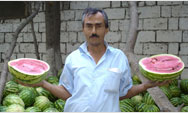ABAD Facilitates Stable Supply Chain Linkages through its Work with Canneries
USAID’s Azerbaijan Business Assistance and Development (ABAD) program has worked with a number of canneries throughout Azerbaijan to improve the efficiency of the supply chain by supporting the proper cultivation of fruits and vegetables required by the processors, facilitating negotiations between the processors and the small-holder producers and farmers, and organizing the supply of agricultural products to the processor. This effort has resulted in a significant overall increase in the supply of raw materials, thereby enhancing sales and local employment.
 |
Workers at the “Optimal” cannery in Lenkoran, southern economic corridor.
The increase in supply of raw materials results in prolonging the seasonal operational period for canneries.
Photo Credit: IRC/Bahruz Mammadov |
The ABAD program’s overall work with canneries served to address one of the main impediments to business growth in Azerbaijan: the lack of cooperation between stakeholders. The lack of cooperation between producers and processors results in both a deficiency of raw materials for processors; and a lack of information for small producers on the processors’ product requirements.
With the active support of ABAD’s central office staff and Marketing Centers, ABAD consultants have made great efforts to link the small-holder producers and farmers with eight canneries throughout rural Azerbaijan. The consultants have continuously supported the producers through all stages of cultivation to provide clear information to producers on how to meet processor requirements. For instance, in Guba-Khachmaz Economic Corridor, one of ABAD’s long-term consultants Hanifa Aslanov has worked with Gafgaz cannery to assist in organizing and increasing the supply of raw materials to the facility. During the provision of the consultancy, Aslanov worked directly with the farmers to increase their productivity through disease control, and to support them in understanding the advantage of working with the processing plant through the provision of information on the raw material requirements of the plant.
The consultancy also contributed to a significant increase in the quantity and quality of the supply to the company for products such as walnuts, cherries, cucumbers, tomatoes, eggplants and peppers; doubling the amount of raw material available for the company. Subsequently, the number of small holder producers supplying the company increased by 333 individuals (from 68 different communities). This increase in raw material availability facilitates uninterrupted operation of the canneries thereby creating more local employment opportunities. According to the Monitoring and Evaluation Unit of the program, after the ABAD consultancy, The Gafgaz cannery experienced a major increase in both employment (44,700 person days), and the level of improved sales ($799,000).
In the southern economic corridor, more than 100 farmer producers were linked with canneries and supplied 4,500 tons of tomatoes and approximately 1,000 tons of processed cucumbers during one season through the direct assistance of ABAD consultants.
Back to Top ^ |


